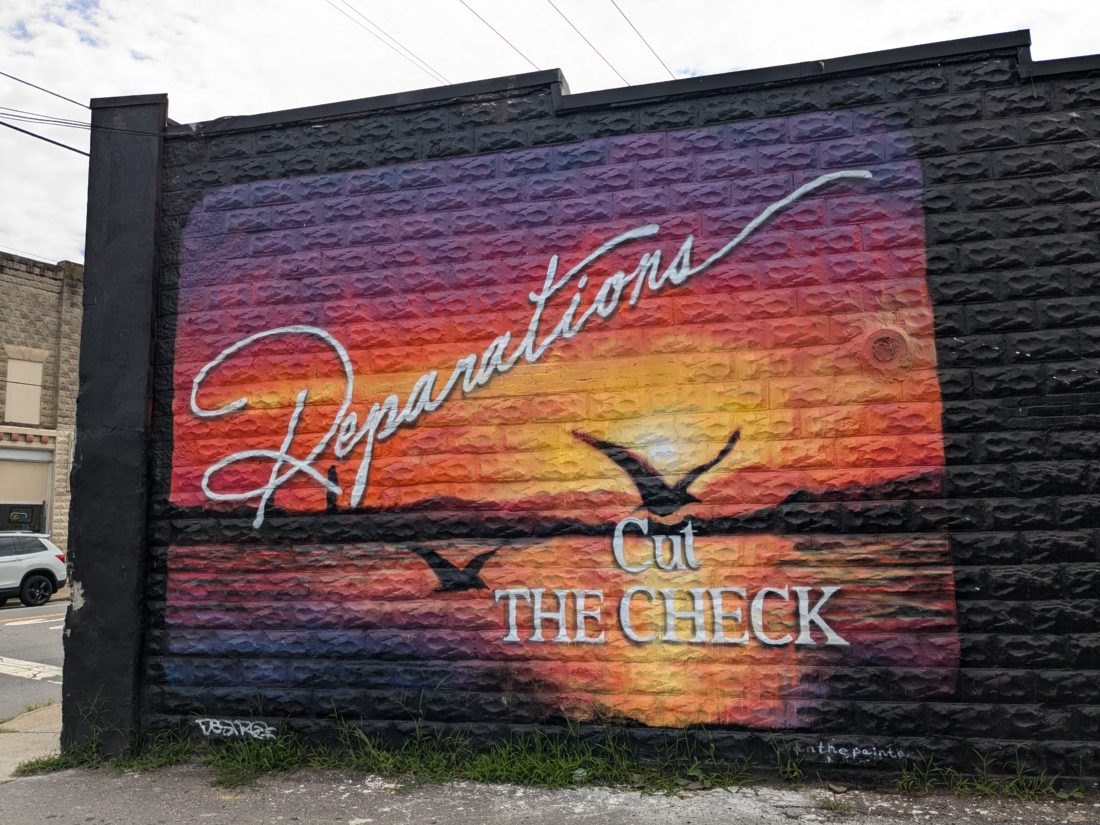In its final meeting July 15, the Community Reparations Commission agreed to request a six-month extension from the Asheville City Council on Tuesday, July 23.
City staff, however, plans to recommend the commission get only another three months to finalize its recommendations for how the city and Buncombe County can repair harm caused by generations of systemic racism and produce a final report.
Commission members pointed out the discrepancy in proposed timelines.
“It feels as though there is direct competition between our leadership and the people that represent the city [and] county,” said commission member Dwayne Richardson. “How did you decide that even though you took in what we said, you came to a conclusion that you would recommend something that was in opposition to what we felt?” he asked Sala Menaya-Merritt, equity and inclusion director for the City of Asheville.
The commission wants six months to continue community engagement around reparations education, write the commission’s final report, create a nonprofit to accept private funds for reparations, form an accountability council, form a reconciliation task force and finalize additional recommendations, according to its draft presentation for the July 23 Council meeting.
Menaya-Merritt said that several of those elements are implementation pieces that are above and beyond what was laid out for the commission in its establishing resolution. She said staff concluded the commission would be able to complete any recommendations and draft a final report in three months, instead of six.
Commission Chair Dewana Little said she had discussed the discrepancy with Menaya-Merritt previously and disagreed with her decision.
“We’re asking for six months to implement the things that we feel are necessary in order to see reparations truly realized through this process. And no, we have not had the time and capacity to focus on the policies and procedures that maintain this perpetual system of harm to Black people,” added Little.
Ultimately, Menaya-Merritt said it would be up to the City Council on how it would handle the extension request.
For the county’s part, Assistant County Manager DK Wesley said the county is not considering an extension, and if City Council approves any extension, the county’s support would remain the same as it is now. The county’s Equity and Human Rights Department is providing staff support, and the Buncombe County Board of Commissioners has dedicated more than $500,000 to the reparations effort for the current fiscal year, but the county halted legal, data and communications support in June, per its previously set deadline.
As part of its pitch for an extension, Little and Vice Chair Bobbette Mays detailed what the commission has accomplished since an extension was first floated at a December Council meeting.
The reparations commission increased its meeting frequency from once to twice a month, held a full-day retreat in June and organized a community engagement committee to create a plan to reach more members, resulting in more than 3,200 contacts with Black residents in March, April and May, Little said.
Commissioners voted on and passed 39 recommendations in May and June, and its final report writing team has met biweekly since June 10, she added.
The commission unanimously agreed to request that City Council add a public comment period after its presentation to allow for community members and commissioners other than Little and Mays to speak in support or against the commission’s requested extension.
City Attorney Brad Branham said any agenda change is ultimately up to Mayor Esther Manheimer.
Far from over
Since it’s possibly the commission’s final meeting, Little gave members the chance to offer some parting words. The work, urged several commission members, is just beginning.
“Whether this is the last meeting or not, [we must] hold government accountable for this process. Moving forward, this is not the end. It is the beginning. It doesn’t end here. Whether we’re back or not, this is ongoing. This has to be a problem-driven, iterative, adaptive process. And if it is not being approached as a problem-driven, iterative, adaptive process, then it will not be successful,” said commission member Keith Young.
Commission members MZ Yehudah, CiCi Weston, Roy Harris, Norma Baynes and Richardson echoed Young’s sentiment.
“Reparations is a promise that was made to address the harms and were perpetrated on Black people. I believe that was done in good faith. And I hope that the city and county follow through on his promise to address the harms. Because at the end of the day, everyone benefits when that happens,” Yehudah said.
“As our ancestors once said to everyone around them, keep running. And if you can’t run, walk. If you can’t walk, crawl. But no matter what you do, keep moving. Let’s keep moving,” Richardson added.






Neverending.
What a waste of resources, money would have been better spent improving schools, violence reduction early child care etc.. Don’t give them extension, they still won’t be able to come up with anything viable and legal in six months.
Follow the money. Transparency issues again with the city
The song that never ends. So many wasted resources and better ways to achieve equality in opportunity.
Good grief. I’m guessing they’re all still getting paid for this virtue signaling exercise. They’ve been told giving goodies to folks of one skin color is illegal and subject to lawsuits, which should have been crystal clear from the get go. If only the governments had spent this money on shoring up public schools in poor districts! That would have meant something tangible to benefit those in need of all colors.
Bureaucrats love to meet and yap. Nothing will come out of this that will be implemented by the council AND survive legal challenge. Race based goodies are clearly illegal. Class based and you’ve got a shot.
Elected and appointed democrackkks DESTROY cities, counties, states and countries. WHY do they HATE America SO much ?